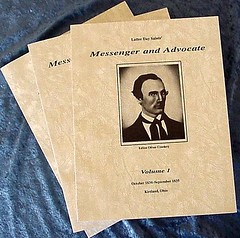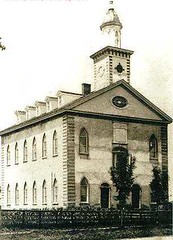The Church and Hate Crime Legislation
Utah legislators may finally pass hate crime legislation this year, thanks to a language overhaul and a statement from The Church of Jesus Christ of Latter-day Saints."The Church of Jesus Christ of Latter-day Saints abhors hatred, intolerance and abuse of any individual or group," said the brief statement from the church released to The Associated Press. "As it has stated consistently over the last three years, the church does not oppose hate crimes legislation, including (House Bill) 90 as drafted."
This is apparently a local Utah issue; however, a couple of questions arise:
1. Is it really necessary to classify certain crimes as hate crimes, with distinct and differing penalties? Shouldn't penal statutes govern conduct, regardless of the motivating factor? Should one receive a more harsh penalty for murder because the victim was of a certain ethnic origin, religious persuasion, or even sexual orientation?
2. Should the Church really be in the hate crime business? Should the Utah Legislature, or any legislature have to use the Church as a crutch to pass legislation? And, should the Church allow itself to be so utilized?







15 Comments:
I'm not a fan of hate crime legislation either, but I don't think it is fair to characterize the Church as being in the "hate crimes business". From their statement, it sounds like they are trying to stay out of the hate crimes business.
last lemming: My characterization (perhaps unfair) stems from the Church's statement itself where it points out it is not opposed to hate crime legistaion, and then specifically names House Bill 90.
Why is it necesssary for the Church to come out and specify any particular bill in terms of whether they oppose or support that bill? This is where I have the trouble. Render unto Ceasar that which is Ceasar's . . .
First I would like to know the context of the statement by the church. Is it a direct response to a question about Bill 90? Is this only a snippet of a larger statement?
Guy, do you live in Utah? I don't myself and never have but the impression I've always gotten is that politics and religion are more closely wedded there than in other parts of the country. I do know that the media tends to assume that any political actions taken in Utah are either supported or opposed by the church. I think that under those circumstances it was necessary for the church to come out and clarify their stand for everyone.
--harpingheather
Should one receive a more harsh penalty for murder because the victim was of a certain ethnic origin, religious persuasion, or even sexual orientation?
If the murder was soley motivated by those things, then I think yes.
Murder is always abhorrent but I think it's somehow moreso when it was only movitated by a desire to end a stranger's life purely for the sake of ending their life.
--harpingheather
ian: I too would like to know the exact context of the statement. I haven't been able to bring it up on the Church website; however, if the article is accurate, it appears it was a pre approved and pre prepared written statement specifically addressing hate legislation. I still have trouble; however, I would like to know more about the surrounding circumstances.
harpingheather: No I don't currently live in Utah; however, long ago and far away I once did. I do believe there are elements of truth that the Church heavily influences politics in Utah. I'm wondering just how good an idea that is, when it comes to specific legislation such as this, particularly when they come out with a specific reference to a specific piece of legislation.
I still have a hard time why murder motivated by a particular belief or hate should be punished more harshly than murder motivated by something else. It seems to give greater weight to certain life and gives less weight to the other life. It seems that the punishable offense is the conduct, not the thought. If one hates another, one is not punished, unless the hate translates to conduct. Inappropriate conduct should always be punished.
garo: I don't know whether the Church is in the hate crime business; however, the appearance just from the article leads one to wonder. As Ian said, it would be very nice to know and understand the context in which this statement was given.
I'm not sure if the hot dog analogy holds up. Hate crime legislation and hotdogs aren't really on the same level. I got the sense from the article that the Church was making this statement almost in an effort to help the bill's author have the legislation pass, with other legislators knowing if the Church didn't oppose the legislation they would vote for it. Perhaps I am reading too much into the article; however, that is the sense I took away after reading it.
First. The Church benefits greatly from hate crimes legislation. When ever a chapel is vandalized, they prosecute as such.
We always consider why a crime is committed. Killing someone is not killing someone is not killing someone. What is wrong with penalizing a criminal more for egregious conditions under witch a crime was perpetrated.
j stapley: If a chapel is vandalized they should indeed prosecute the crime, regardless of whether the "criminal" hates Mormons, or what ever the religion. The crime is not the hate of the group but the vandalism of chapels. Why can't the punishment be the same for the vandalism alone?
I don't think it is wrong to penalize a criminal for more egregious conditions in which a particular crime is committed; however, I interpret that to mean the more egregious conduct of the criminal. I also agree that "Killing someone is not killing someone is not killing someone."
For example one convicted of murder in the first degree based on the conduct that merits the charge of first degree should absolutely be punished more harshly than one who is convicted of say manslaughter. But, the distinction is the conduct of the criminal in committing the crime.
I don't see why one should be more harshly penalized for committing a first degree murder simply because the criminal might also harbor hatred toward a particular religious affiliation, or ethnic background, or even sexual preference. I believe actions have consequences, and it is the action that brings about the consequence, not the motivating factor in the action.
To take a specific case in point: Why should the murderers of Matthew Shepard be punished more severely because some claim there was hatred toward gays? What is being punished? It is (or should be) the reprehensible conduct in savagely beating an innocent human being to death. It is not the thought process or motivation of the criminals.
I may be wrong . . . but that's the way I see it. Good comments by everyone on this post. They help me think through the analysis in better detail.
I'm disappointed that the Church made the statement that it did. The best argument I can find against more severe punishment for so-called "hate crimes" comes from the Book of Mormon, Alma chapter 30, verses 7, 10, and 11:
7: Now there was no law against a man’s belief; for it was strictly contrary to the commands of God that there should be a law which should bring men on to unequal grounds.
10: But if he murdered he was punished unto death; and if he robbed he was also punished; and if he stole he was also punished; and if he committed adultery he was also punished; yea, for all this wickedness they were punished.
11: For there was a law that men should be judged according to their crimes. Nevertheless, there was no law against a man’s belief; therefore, a man was punished only for the crimes which he had done; therefore all men were on equal grounds.
This recent event might relate to the topic being discussed:
http://deseretnews.com/dn/print/1,1442,635179009,00.html
Two Radio Shack employees, wearing black pants, white shirts, and Radio Shack nametags, were on their break and tossing a football in front of a Radio Shack in Sandy, Utah, when assaulted by a carload of 3 young men who mistook them for LDS missionaries. The employee who received the physical injuries is not LDS.
MahNahvu: Thank you for this link and reference. I think it does have relevance to our discussion here. Should the perpetrators have received a harsher penalty for assaulting these Radio Shack employees, because they thought they were LDS missionaries? What if they had actually been missionaries, should the penalty be harsher because they were? If so why?
Are the Radio Shack employees deserving of any less protection under the law than missionaries or anyone else for that matter? Are they somehow of lesser legal status because they were not LDS missionaries. Or, are missionaries entitled to some higher legal protection?
soggy bottom: Thanks for this reference to Alma. Interesting analysis.
Just today three people were victims of hate in a gruesome attack at a Mass. gay bar. One is in critical condition.
http://www.boston.com/news/local/massachusetts/articles/2006/02/03/candlelight_vigil_at_site_of_hate_crime_draws_about_150/
There is a Wikipedia article on hate crime, which relates both points of view:
http://en.wikipedia.org/wiki/Hate_crime
One of the reasons why hate crimes may be considered more serious than non-hate motivated crimes is that hate crimes are 'message' crimes. They differ from other crimes in that the offender is sending a message to members of a certain group that they are unwelcome. Research indicates that hate crimes have more serious psychological effects than non-bias motivated crimes.
MahNahvu: Thank you for the further links on this issue. I am still unpersuaded that hate crime laws or legislation are justified. I just think people should be punished for their own actions. I don't know how law enforcement can climb inside someone's head to determine certain actions are precipitated by hate, or bias.
It is indefensible that any person was attacked at a bar as the article described. They should be punished, regardless of who the victim was, or what the victim's sexual preference was.
Just a few additional thoughts, to expand on the point I made in the previous comment.
The guy that was mistaken for a missionary will probably bounce back and suffer few emotional scars, because he has little emotional connection to mormon missionaries. LDS members, missionaries and their families, however may experience emotional effects from this hate crime.
The victims in the gay bar may recover from their physical wounds but suffer deeply for many years emotionally, because they belong to the group that was targeted. Even the bartender, who was not injured physically, was not willing to give his last name to the press out of fear of further violence. In fact, the entire Bedford gay community are victims of this crime, and may carry emotional and psychological scars as a result.
For these reasons, and others, I believe hate crimes are much more serious than non-hate crimes, and can understand why they may receive harsher penalties.
I am still unpersuaded that hate crime laws or legislation are justified. I just think people should be punished for their own actions.
The attack in Sandy, Utah was against LDS missionaries as a group. The Radio Shack employees were also victims. Because this attack was intended to terrorize a specific group it becomes a different type of crime than simply a random attack upon two guys outside of a Radio Shack store. More people are targeted and effected. Hence, it is a more serious crime.
If someone spray-paints graffiti on an overpass it is considered vandalism. If someone spray-paints anti-semitic slurs on the wall of a synagogue it is a much more serious crime. It is more than merely spray-paint on concrete, more than merely vandalism. It is a hate crime that the state considers detrimental to the stability of society and requires a harsher penalty than that given for benign graffiti on concrete.
Post a Comment
<< Home